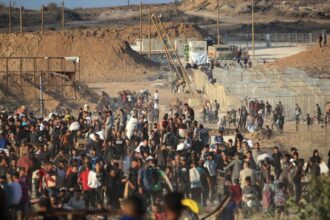In a stark escalation of international criticism, the United Nations human rights office declared Tuesday that deliberate restrictions on food aid to Gaza could potentially constitute a war crime, signaling mounting global concern over the humanitarian crisis engulfing the Palestinian enclave.
“The willful impeding of humanitarian relief supplies may amount to using starvation as a method of warfare, which is a war crime,” UN rights office spokesperson Jeremy Laurence told reporters in Geneva, delivering one of the most forceful statements yet from the international body regarding the ongoing conflict.
The warning comes as humanitarian conditions in Gaza have deteriorated catastrophically since Israel launched military operations following the October 7 Hamas attack. According to UN agencies, approximately 1.1 million Palestinians—nearly half of Gaza’s population—now face “catastrophic” levels of hunger, with children particularly vulnerable to malnutrition and related illnesses.
Israel has repeatedly denied allegations of deliberately restricting aid, with government officials pointing to Hamas diversion of supplies as the primary obstacle to effective distribution. However, multiple international organizations, including the World Food Programme, have documented systematic challenges to aid delivery that extend beyond security concerns.
“When we look at the patterns of restricted access, destroyed infrastructure, and bureaucratic impediments, there emerges a concerning picture that demands accountability,” said Helena Fraser, former UN humanitarian coordinator, speaking to CO24 World News in a recent interview.
The timing of the UN statement coincides with intensified diplomatic efforts to secure a ceasefire. U.S. Secretary of State Antony Blinken arrived in the region this week, his seventh visit since the conflict began, pressing for an agreement that would include significant increases in humanitarian assistance.
Meanwhile, Canadian officials have joined other G7 countries in calling for unimpeded aid access. “The situation has crossed critical thresholds that the international community cannot ignore,” Foreign Affairs Minister Mélanie Joly stated at a recent press briefing.
Legal experts note that proving intent would be crucial in any potential war crimes case. “The Rome Statute requires establishing that restrictions were deliberate and knowing, not simply the result of combat operations or security measures,” explained Leila Sadat, international criminal law professor at Washington University.
For ordinary Gazans, the legal distinctions matter little amid daily struggles for survival. Aid workers report families resorting to animal feed and plant roots as food sources become increasingly scarce, with water treatment facilities operating at minimal capacity.
As diplomatic and legal pressure mounts, the fundamental question remains: will international warnings translate into meaningful action to address a humanitarian catastrophe that grows more dire with each passing day?

























